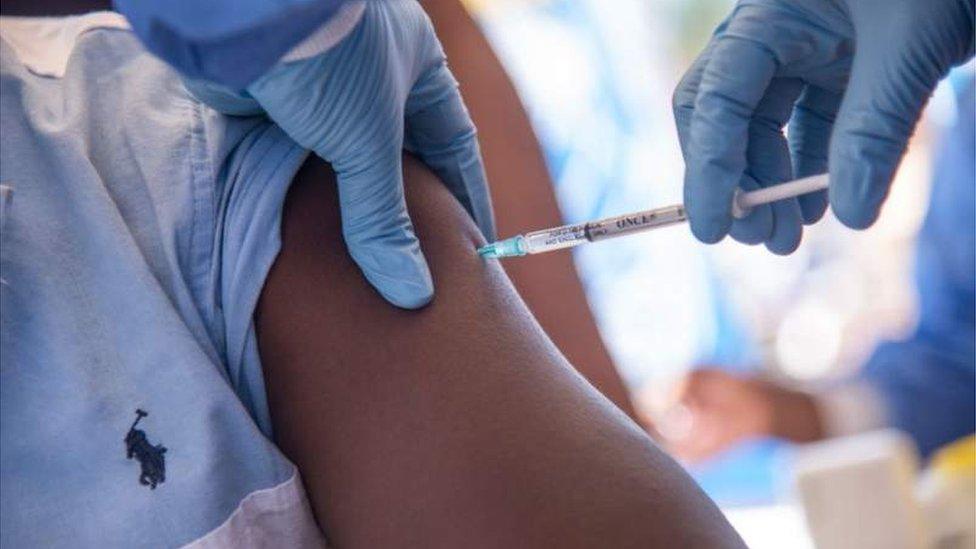DR Congo election: Martin Fayulu's ambition to be president
- Published
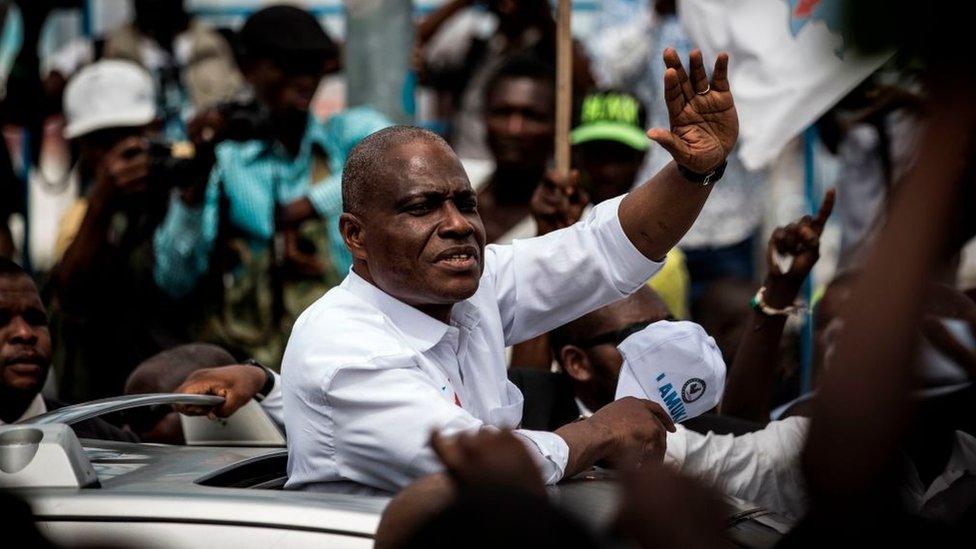
Ex-oil tycoon Martin Fayulu has emerged as one of the main candidates in this month's presidential election in the Democratic Republic of Congo, writes the BBC's Dickens Olewe.
Martin Fayulu means business.
A campaign poster for the former oil executive shows him conscientiously rolling up his sleeves, ready to run the country.
Underneath, a slogan promises that he wants to create "a dignified and prosperous Congo".
Allow X content?
This article contains content provided by X. We ask for your permission before anything is loaded, as they may be using cookies and other technologies. You may want to read X’s cookie policy, external and privacy policy, external before accepting. To view this content choose ‘accept and continue’.
But Mr Fayulu, 62, faces stiff competition in the shape of Emmanuel Ramazani Shadary, the ruling party candidate and a loyalist of outgoing President Joseph Kabila, and Felix Tshisekedi, another opposition leader.
He was a surprise choice when he was unveiled as the Lamuka coalition's presidential candidate last month.
Opposed Mobutu
Despite becoming a full-time politician in 2006, and serving as an MP, he is mostly known as a businessman.
His critics say this will count heavily against him in the election, and they doubt he will advance the interests of poor people if he wins.
Mr Fayulu's involvement in politics started during the Sovereign National Conference in 1991 that brought together delegates from different regions, political parties, civil society organisations and traditional leaders to campaign for multi-party democracy.
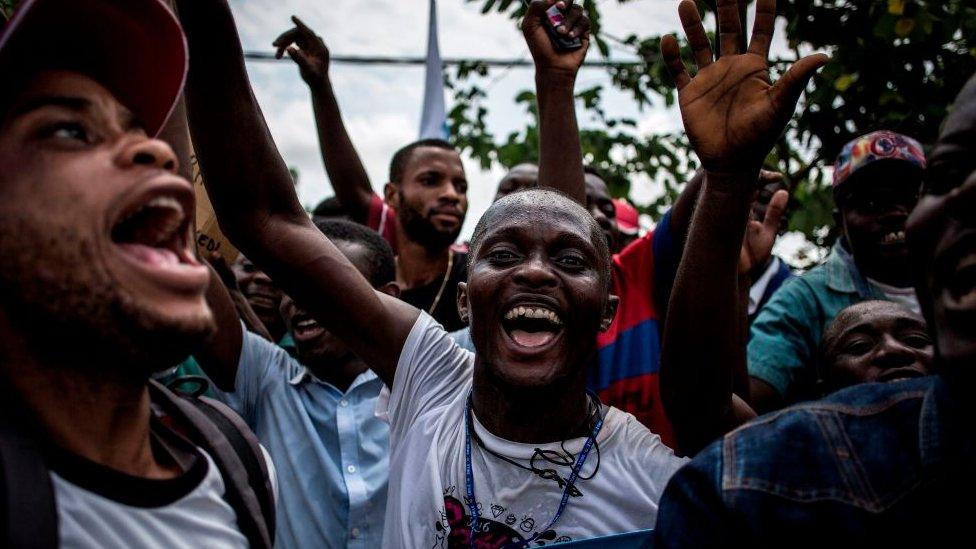
Martin Fayulu's supporters are confident he will cause an upset
The ruler at the time, Mobutu Sese Seko, allowed the conference to take place after coming under domestic and foreign pressure to end one-party rule. But he ignored the call for multi-party democracy, and was eventually forced out of power in 1997.
Mr Fayulu's transition from business to politics was complete in 2006 when he was elected an MP.
'Vote could split'
Before that, he had had a two-decade-long career, starting in 1984, with US oil giant Exxon Mobil, taking up positions in several African states.
His final posting was in Ethiopia where he was the company's director general.
In March 2009, Mr Fayulu helped launch the Commitment for Citizenship and Development political party and was appointed its leader. He is currently one of the party's three MPs, which suggests that it does not command huge support among voters.
Days after Mr Fayulu was unveiled as the opposition's unity candidate, two members of the alliance, Felix Tshisekedi and Vital Kamerhe, backed out of the agreement.
They said their supporters opposed Mr Fayulu.
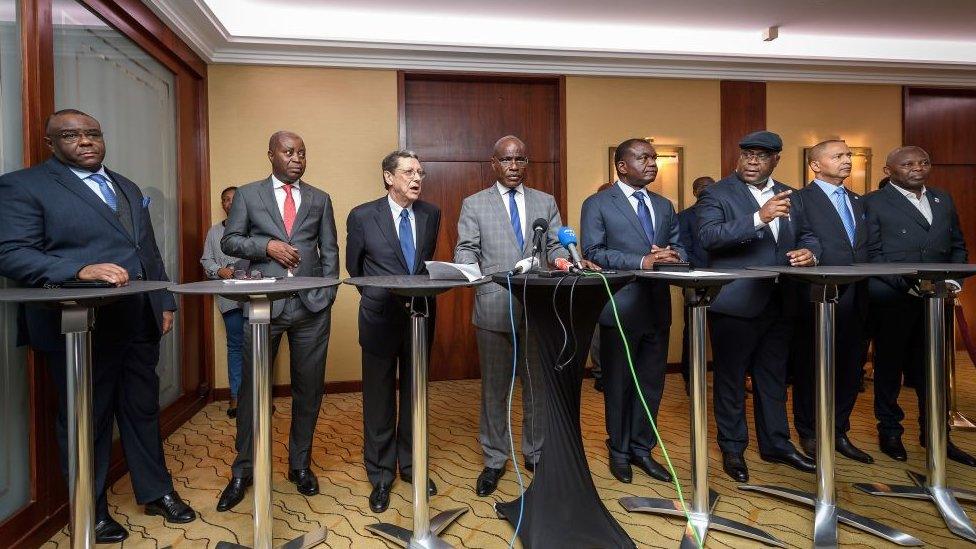
Martin Fayulu initially had the backing of all opposition leaders
Now, Mr Tshisekedi, the son of veteran opposition leader Etienne Tshisekedi, who died in 2017, is also a presidential candidate, and his presence on the ballot threatens to split the opposition vote.
Grazed by bullet
But Mr Fayulu is confident that he has enough support to win. He has two heavyweight backers, former Vice-President Jean-Pierre Bemba and Moise Katumbi, the former governor of the mineral-rich Katanga province, who were both barred by the electoral commission from running.
"Congolese call me [the] people's soldier," Mr Fayulu told the BBC's Focus on Africa radio programme, brushing off a question that he is unknown.
The businessman has been involved in protests against the extension of Mr Kabila's time in power. The president's second and final term in office should have ended in 2016 and delays in holding the presidential election led to suspicions that he was trying to cling to power.

The 'people's soldier'

Born in Kinshasa on 21 November 1956
A Christian by faith
Known to his supporters as the "people's soldier"
Ended 20-year career with Exxon Mobil in 2003
Elected MP in 2006 and 2011
Launched political party in 2009

On 19 September 2016 a bullet grazed Mr Fayulu's head after police fired at anti-Kabila protesters in the capital, Kinshasa. At least 17 people were killed in the clashes.
"Fayulu was at the protests to oppose Kabila so many people in Kinshasa will be familiar with him," Francesca Bomboko, director of polling organisation Berci International, told the BBC.
"His nomination as the joint opposition candidate has no doubt increased his visibility which might help increase his popularity," she added.
Almost as if to dispel questions about his public profile, Mr Fayulu has been sharing aerial pictures of his rallies showing huge crowds.
Allow X content?
This article contains content provided by X. We ask for your permission before anything is loaded, as they may be using cookies and other technologies. You may want to read X’s cookie policy, external and privacy policy, external before accepting. To view this content choose ‘accept and continue’.
Some of the rallies have, however, been disrupted by security forces and in some cases this has led to his supporters being killed. Campaign group Human Rights Watch has accused the authorities of violently suppressing his rallies.
"He's the one who embodies the real opposition... if he remains incorruptible, Fayulu can become the new Etienne Tshisekedi," Congolese political analyst Albert Moleka said.
"Kabila sees Fayulu as a radical and I think he must be starting to see the threat that Fayulu could represent for him."

More on DR Congo:

Mr Fayulu's say he wants to restore security in the conflict-hit country and plans to relocate the army's main logistics base from Kinshasa to the east, a focal point of violence.
He also aims to change mining and oil contracts to benefit the country, and points to his career at Exxon Mobil as having prepared him for the job.
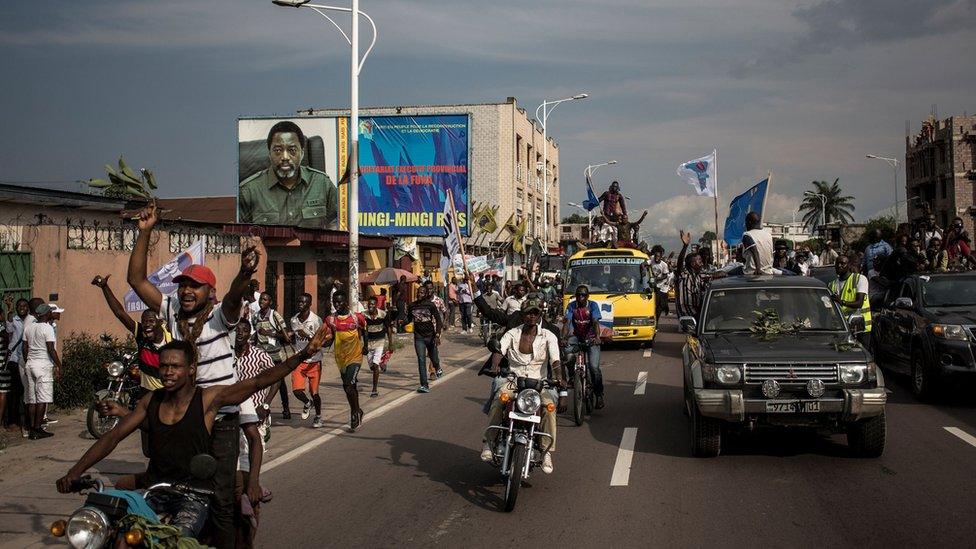
DR Congo has never had a peaceful and democratic transfer of power
Despite the challenges, Mr Fayulu is upbeat about his prospects of becoming the next president of the vast central African state.
"My chances are huge," he told the BBC.
"And with a candidate as weak as Mr Shadary there is no problem. I have an enlarged base across the territory," he said.
As well as being a well-known figure in the capital Kinshasa, where he owns a hotel, his family hails from the western province of Bandundu, meaning he could pick up votes there too.
He hopes the presence of another big opposition candidate will not damage his chances in the vote, after which he wants to roll up his sleeves and get on with the job.
- Published11 December 2018
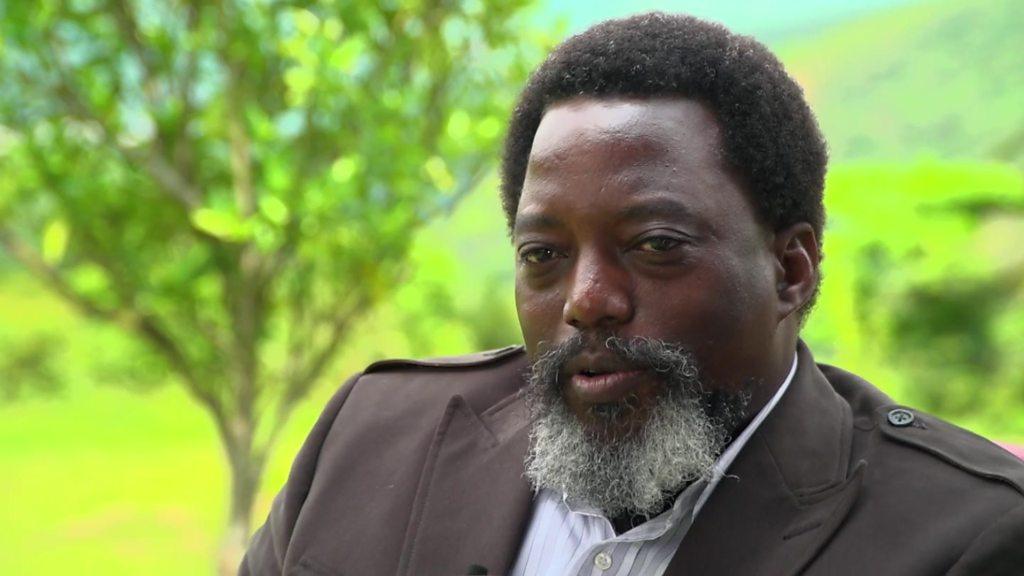
- Published31 January
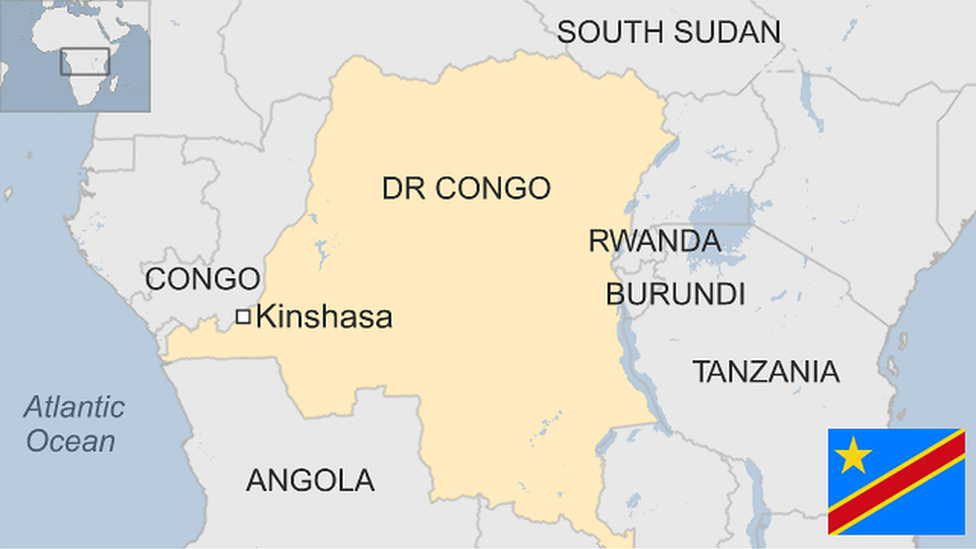
- Published30 November 2018
